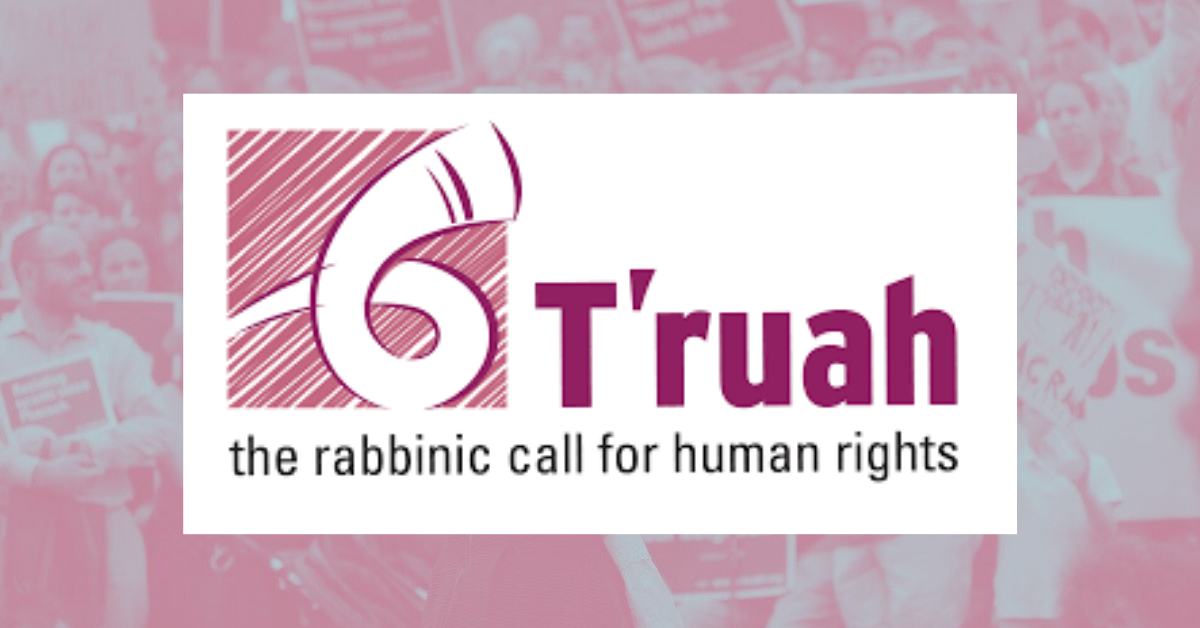NEW YORK — In an effort to bring more transparency to the fight for human rights in the occupied territories, a rabbinic human rights organization announced its support of a bill that would bring increased sunlight to U.S. foreign aid spending on Israel. T’ruah, representing over 2,000 rabbis and cantors and their communities in North America, released the following statement endorsing HR 2590, the Defending the Human Rights of Palestinian Children and Families Living Under Israeli Military Occupation Act, introduced in the House by Rep. Betty McCollum last week.
The bill does not change the amount of aid going to Israel or condition aid. It prohibits U.S. funding from being used to detain minors, to demolish or seize Palestinian property, or move toward annexation, and mandates reporting on any such abuses, in addition to how certain aid to Israel is spent.
Rabbi Jill Jacobs, executive director of T’ruah, released the following statement:
“United States tax dollars allocated for Israel should not be used to violate the human rights of people living in the occupied territories, including detaining children, demolishing and seizing homes, forcibly transferring populations, or aiding the further annexation of Palestinian land.
“Although it does not change the amount of money going to Israel or threaten security programs like the Iron Dome, this bill would establish transparency about how U.S. funding is being spent, similar to that required of foreign aid to other recipient nations. This would enable Congress to better carry out its responsibility to conduct oversight over how U.S. taxpayer funds are used. The reporting required by the bill should also facilitate a healthy conversation in Congress about occupation — a crucial step toward ending the occupation and building a better future for Israelis and Palestinians.
“Specifically, HB 2590 would require the Secretary of State to certify to Congress that no U.S. funding has been used by Israel for a range of activities that involve human rights abuses. If unable to make such a certification, the Secretary of State would be obligated to report in detail on such violations and the U.S. funds spent on them. The bill would also require reporting on U.S. funds granted to Israel for offshore procurement — that is, how Israel is spending U.S. aid earmarked by Congress specifically for military-related purchases from within Israel or from countries other than the United States (Israel is the only country that receives such an earmark). The current security assistance Memorandum of Understanding between the United States and Israel gradually phases out this offshore procurement, but through 2028, billions of dollars will be granted under this category, which effectively constitutes a blank check.
“Transparency is crucial both in human rights law and in Judaism, as one cannot address human rights abuses without first exposing them. The McCollum bill will offer an accounting of U.S. aid to Israel, and ensure that — in accordance with existing United States law — funding is not being used to detain children or carry out other human rights abuses. According to rabbinic tradition, after the completion of the Mishkan (tabernacle) in the wilderness, some community members raised questions about whether Moses had been honest in his accounting of the donations that the people contributed toward the construction. In response to these murmurings, Moses gave a full accounting. (Shmot Rabbah 51:6) Per one tradition, ‘even though Moses alone was treasurer, he called upon others to audit the accounts on their own.’ (Shmot Rabbah 51:1)
“T’ruah supports the passage of HR 2590, representing a concrete step toward bringing transparency to the manner in which U.S. funding is used; ensuring that U.S. money is not used to detain children, demolish homes, seize property, transfer populations, or extend annexation; and holding Israel to the same moral standard as other countries.”
About T’ruah: The Rabbinic Call for Human Rights
T’ruah: The Rabbinic Call for Human Rights mobilizes a network of more than 2,000 rabbis and cantors from all streams of Judaism that, together with the Jewish community, act on the Jewish imperative to respect and advance the human rights of all people. Grounded in Torah and our Jewish historical experience and guided by the Universal Declaration of Human Rights, we call upon Jews to assert Jewish values by raising our voices and taking concrete steps to protect and expand human rights in North America, Israel, and the occupied Palestinian territories.

